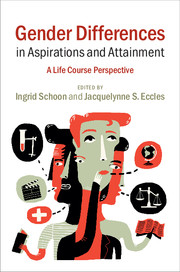Book contents
- Frontmatter
- Contents
- List of Figures
- List of Tables
- Notes on Contributors
- List of Abbreviations (selected)
- Part I Introduction
- Part II The early school years
- Part III Career planning during adolescence
- Part IV Choosing a science career
- Part V Longer-term consequences of early experiences
- 16 The life course consequences of single-sex and co-educational schooling
- 17 Pathways to educational attainment in middle adulthood
- 18 How gender influences objective career success and subjective career satisfaction
- Part VI The role of context
- Index
- References
18 - How gender influences objective career success and subjective career satisfaction
The impact of self-concept and of parenthood
Published online by Cambridge University Press: 05 October 2014
- Frontmatter
- Contents
- List of Figures
- List of Tables
- Notes on Contributors
- List of Abbreviations (selected)
- Part I Introduction
- Part II The early school years
- Part III Career planning during adolescence
- Part IV Choosing a science career
- Part V Longer-term consequences of early experiences
- 16 The life course consequences of single-sex and co-educational schooling
- 17 Pathways to educational attainment in middle adulthood
- 18 How gender influences objective career success and subjective career satisfaction
- Part VI The role of context
- Index
- References
Summary
Abstract
Despite excellent educational backgrounds women are still less successful in their occupational careers than men. The present research tests hypotheses derived from a dual-impact model of gender- and career-related processes in a longitudinal study with 1,015 German professionals over a time span of 10 years. In line with predictions, parenthood had a negative influence on women’s objective career success that was completely due to a reduced workload and career discontinuities during their children’s early childhood. In contrast, parenthood had a slightly positive effect on men’s objective career success that was independent of workload. Moreover, the participants’ self-concept had an influence both on parenthood (participants with a more “communal” self-concept, e.g., warmth and empathy, were more often parents) and on career success (participants with a more “agentic” self-concept, e.g., assertiveness and independence, were more successful). Both men’s and women’s career satisfaction could be predicted by their degree of agency and by workload. Parents were more satisfied with their careers than non-parents, and this effect was stronger for women than for men. Implications of these findings with respect to the dual-impact model of gender and with respect to applied issues are discussed.
- Type
- Chapter
- Information
- Gender Differences in Aspirations and AttainmentA Life Course Perspective, pp. 412 - 426Publisher: Cambridge University PressPrint publication year: 2014
References
- 2
- Cited by



